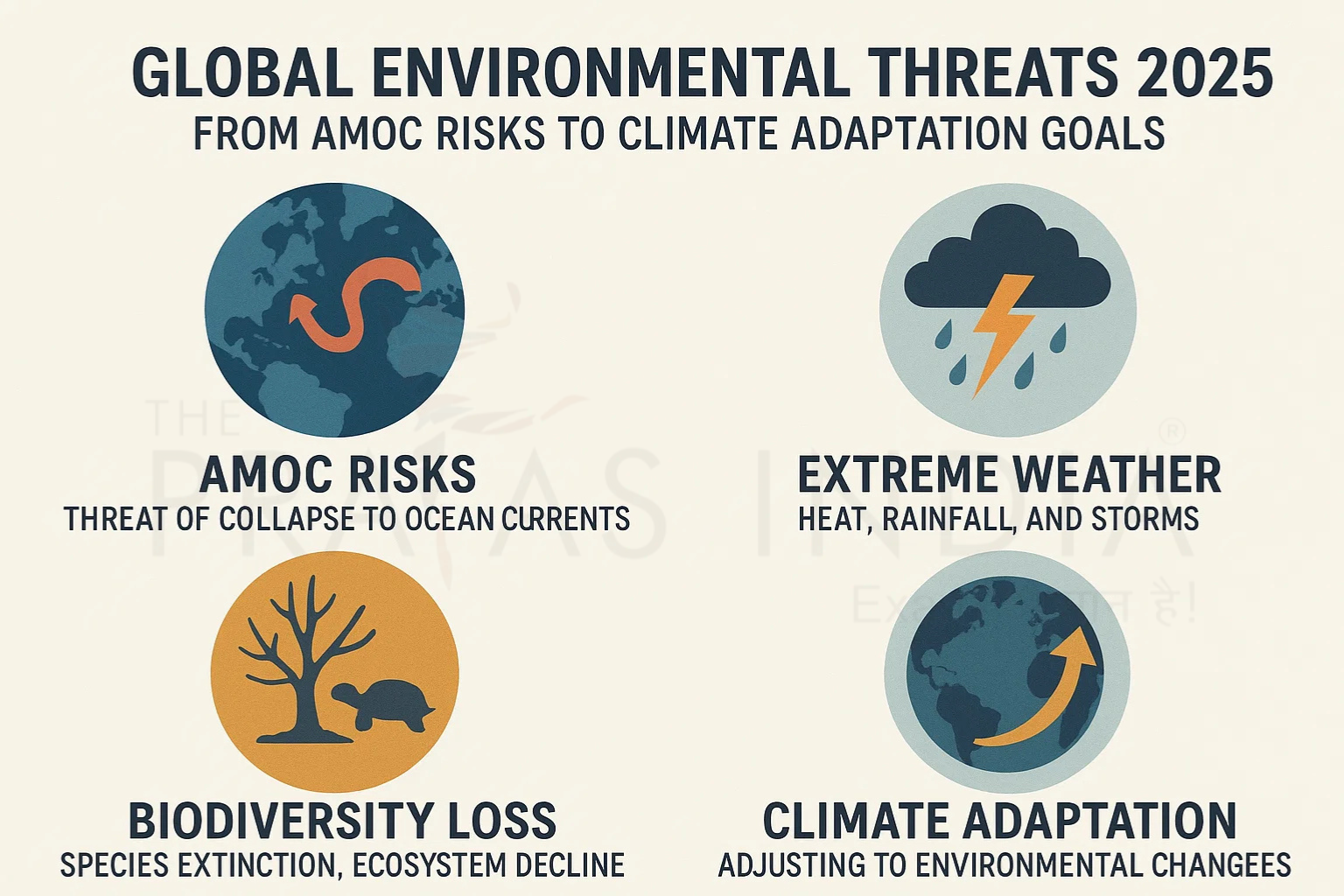Global Environmental Threats 2025: From AMOC Risks to Climate Adaptation Goals
In 2025, the world stands at a critical crossroads in the fight against climate change. From the alarming findings on the possible collapse of the Atlantic Meridional Overturning Circulation (AMOC) to the evolving strategies discussed at the Bonn Climate Change Conference, environmental threats are no longer future possibilities—they are urgent global realities.
This article explores two key developments shaping environmental discourse in mid-2025 and explains their significance under GS Paper III (Environment) and GS Paper II (International Relations) for UPSC aspirants.

🌊 AMOC Collapse: A Looming Global Climate Risk
In June 2025, a groundbreaking study led by Dr René van Westen from Utrecht University warned of the potential collapse of the AMOC, one of the Earth’s most important ocean current systems. The AMOC transports warm water from the tropics to the North Atlantic and returns cold water southward, helping regulate global climate.
⚠️ What’s Causing the Disruption?
-
Melting Greenland ice sheets are releasing large amounts of freshwater into the North Atlantic.
-
This reduces seawater salinity, weakening the density-driven sinking motion essential for AMOC functioning.
-
The result is a disruption of global heat circulation, causing regional climate anomalies.
🔍 Projected Impacts of an AMOC Collapse
-
Extreme winters in Europe: London could experience temperatures as low as –19°C, while Oslo might reach –48°C.
-
Weaker Indian monsoon: A disrupted AMOC could shift the Intertropical Convergence Zone southward, weakening monsoonal rainfall in South Asia and West Africa.
-
Shifting rainfall patterns: Amazon and Sahel regions may suffer altered precipitation, threatening food security.
-
Greater seasonal extremes: Harsh winters may contrast with hotter, longer summers, increasing infrastructure stress.
🌍 Bonn Climate Change Conference 2025: A Global Push for Adaptation
Running from 16–26 June 2025, the Bonn Climate Change Conference (held under the UNFCCC) is setting the stage for COP30 later this year. With over 5,000 delegates attending, the conference has placed strong focus on:
-
Climate adaptation strategies
-
Global Goal on Adaptation (GGA)
-
Financing for climate resilience
-
Support for developing nations
📌 What is the Global Goal on Adaptation?
-
Introduced in the Paris Agreement (2015) and operationalised at COP28 in Dubai, the GGA aims to create a unified framework for measuring and enhancing adaptation efforts globally.
-
It complements the goal of limiting warming to 1.5°C, focusing on resilience rather than emissions alone.
💬 Key Themes in Bonn 2025
-
Funding mechanisms: Push for predictable, accessible climate finance for developing countries.
-
Capacity building: Technical support for nations to design and implement local adaptation strategies.
-
Equity and climate justice: Prioritising vulnerable communities, especially in the Global South.
India, as a developing country, has actively participated, stressing the need for climate equity, technology transfer, and respect for Common But Differentiated Responsibilities (CBDR).
📘 Why This Matters for UPSC Aspirants
These developments are crucial for multiple parts of the UPSC syllabus:
GS Paper III (Environment & Ecology)
-
Climate change and its impact
-
Environmental pollution and degradation
-
Conservation strategies
-
Environmental governance and global agreements
GS Paper II (International Relations)
-
Role of international organizations (UNFCCC, IPCC)
-
India’s foreign policy on climate change
-
Multilateral agreements and diplomacy
-
Global South and climate equity
Essay Paper & Interview
-
Adaptation vs Mitigation
-
Climate Justice
-
Technology and climate resilience
-
India’s leadership role in global environmental forums
✅ Conclusion
The twin challenges of a potential AMOC collapse and the urgent push for global adaptation strategies highlight the unpredictable and interconnected nature in 2025. For India and the world, the road ahead demands proactive planning, international cooperation, and a commitment to environmental equity.
At The Prayas India, we help aspirants connect real-world global issues with exam-relevant insights—preparing for success and leadership in solving tomorrow’s biggest challenges.




![Prayas-तेजस [UPSC CSE Sociology Optional] – Online & Offline](https://theprayasindia.com/wp-content/uploads/2025/09/Prayas-तेजस-UPSC-CSE-Optional-Subject-The-Prayas-India-300x300.png)
![Prayas-सूत्र [UPSC CSE Materials (Hardcopy)]](https://theprayasindia.com/wp-content/uploads/2025/09/Prayas-सूत्र-UPSC-CSE-Study-Materials-Hardcopy-The-Prayas-India-300x300.png)
![Prayas-मंत्रा [UPSC CSE CSAT]](https://theprayasindia.com/wp-content/uploads/2025/09/Prayas-मंत्रा-UPSC-CSE-CSAT-The-Prayas-India-300x300.png)
![Prayas सारथी [UPSC CSE One on One Mentorship]](https://theprayasindia.com/wp-content/uploads/2025/09/Prayas-सारथी-UPSC-CSE-One-on-One-Mentorship-The-Prayas-India-300x300.png)










